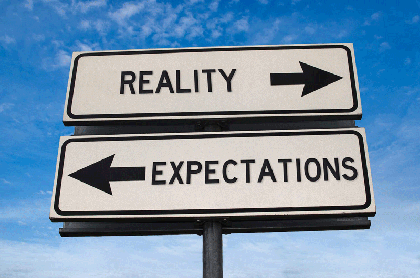Don’t stay trapped in Hoping for your partner to Change
If you find yourself in an unhealthy relationship, simply holding onto hope that your partner will change during brief moments of harmony and bliss can keep you ensnared.
When one partner fixates on the prospect of a better future and focuses on the good times while disregarding the turbulent periods in between, they often become trapped in a harmful cycle that can persist for years without meaningful change.
In healthy relationships, there are natural ebbs and flows of harmony, disruption, and resolution. In fact, it's crucial to recognise that no two people can maintain continuous harmony.
Even in strong relationships, uninterrupted accord is a rarity, occurring only around 30% of the time. The remaining 70% is characterised by moments of conflict followed by constructive ways to address and solve issues, which ultimately strengthen trust in the relationship.
The Unhealthy Relationship Cycle
In the initial stages of most relationships, both partners typically present their most agreeable sides. This phase is marked by mutual discovery, and as feelings continue to grow positively, love deepens, leading to commitment.
Surprisingly, based on data collected from over a thousand individuals regarding their dating experiences, there is usually minimal conflict until they enter the committed phase of their relationship. This lack of conflict can foster the illusion of a perfect match. However, over time, issues inevitably emerge, and couples lacking the tools to address these ruptures find themselves navigating turbulent waters.
Some of the unforeseen problems that often surface in unhealthy relationships include incidents when one partner consistently:
1. Refuses to take responsibility and instead blames their partner, turning issues into character flaws or deficiencies.
2. Emotionally withdraws, using silence as a means to punish the partner for perceived hurts.
3. Appears to take ownership of the problem but ultimately holds the other responsible for the issue.
4. Claims superiority and expects the final say, demanding agreement or silence from the other.
When one partner consistently adopts any of the above approaches, the other (hopeful) partner, despite lingering unease, welcomes the return to a familiar, positive connection and gives in to the destructive approach (e.g., accepts blame, tries to break the partner's punishing silence, or agrees with the other person etc), bringing temporary respite. However, it's only a matter of time before another issue disrupts the calm.
The Deceptive Nature of Harmony
In this relationship cycle, the periods of "harmony" following disruptions become a superficial "repair" that can foster false hope that change is possible. These sporadic positive experiences create a powerful illusion, leading to denial of the serious underlying problems.
Embracing Conflict
Many people wonder how to avoid these problematic behaviours when seeking a partner. The key is to embrace conflict.
During the dating phase, it is crucial to be authentic, express your desires and expectations, and engage in healthy disagreements. It is never healthy to be the one who always gives in or never communicates their needs. Conflict, when handled well, can be an insightful aspect of a potential partner's ability to resolve problems.
Thriving relationships are those that experience periods of disruption when conflicts arise, and both partners feel safe being themselves, communicating their needs, and knowing the other will listen and work together. True repair leads to a deeper and more trusting connection in the relationship.
Letting Go of Hope for Change
If you find yourself stuck in a relationship where there is no equal balance in how problems are resolved, it's vital to consider strategies for breaking free and regaining control over your life.
Here are some practical steps to help you disentangle yourself from a relationship that no longer serves your well-being:
1. Self-Reflection
Begin by introspectively assessing the relationship. Are you genuinely happy, or are you just hoping for change? Reflect on your own needs, desires, and personal boundaries.
2. Seek Support
Reach out to friends, family, or a therapist who can provide you with emotional support and guidance. Talking to someone you trust can help you gain clarity on your situation.
3. Set Boundaries
Establish clear boundaries in the relationship and communicate them with your partner. Be honest about your feelings and needs. In some cases, this open communication might lead to positive changes.
4. Counselling or Therapy
Consider couples counselling or individual therapy to address the issues in the relationship. A professional can help you navigate your emotions and provide tools for resolving conflicts.
5. Weigh the Pros and Cons
Evaluate the relationship objectively. Weigh the positive and negative aspects to determine if the effort to salvage it is worth the potential benefits.
6. Legal Matters
If the relationship involves legal or financial entanglements, consult with a lawyer to understand your rights and responsibilities.
7. Plan for Independence
Begin making plans for your independence. This might involve finding a new place to live, securing financial stability, and building a support network.
8. Be Prepared for Change
Understand that breaking free from a long-standing relationship can be emotionally challenging. Be prepared for a range of emotions and seek professional help or support as needed.
9. Prioritise Self-Care
As you navigate the transition, focus on self-care. Engage in activities that bring you joy, practice mindfulness, and prioritise your mental and physical well-being.
10. Follow Through
Once you've made the decision to end the relationship, be resolute in your actions and follow through with your plans. Seek guidance from professionals, friends, or support groups if needed.
Breaking free from a stagnant or abusive relationship can be a challenging process, but it's often necessary for personal growth and well-being.
Remember that you deserve a healthy, fulfilling, and mutually respectful relationship. By taking these steps and seeking the right support, you can regain control over your life and move toward a brighter future.



















